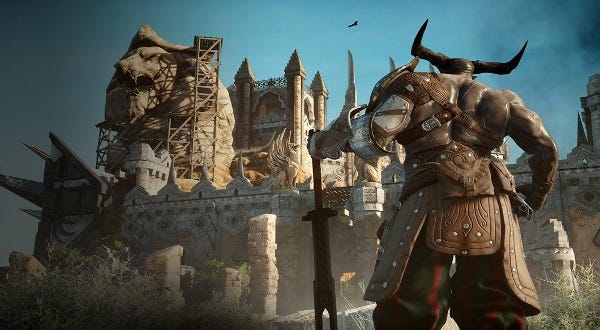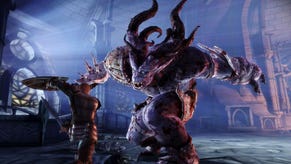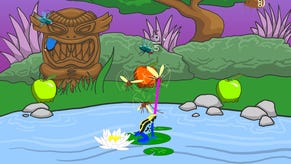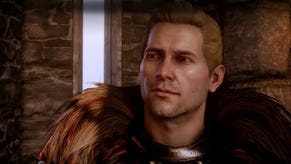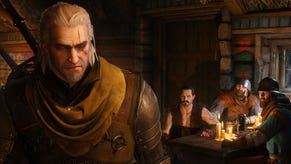BioWare On Race, Romance, And (R)Time In Dragon Age
Who Quizzes The Inquisitors, Pt 2
Has it really been an entire age since Dragon Age: Inquisition lead designer Mike Laidlaw and I last spoke? Of course not. The first part of our interview went up yesterday. We discussed combat, choice, and exploration, and today we're delving even deeper into the rabbit hole dragon den of certain doom. Read on to find out how race/sex, crossovers with previous DA games, romance, and more will function in BioWare's hopeful return to form.
RPS: You can choose your race and your sex again in this one. I assume that'll have a pretty major impact on what you see and don’t see this time around? You previously noted that the year-long delay allowed you to make some pretty big changes on this front.
Laidlaw: To some degree. Our big goal is that there’s some sort of significant impact to making that choice. I don’t think I want to spend the entire game being called a knife-ear because I chose an elf, over and over again. At that point it just becomes background noise. But at least at one or two points in the game, I want it to rear up and say, “So you chose elf! Cool! Let’s deal with that.” That, to me, is a very intriguing element of the game and it always has been.
RPS: Yeah. It’s something that genres like fantasy or sci-fi are pretty well-equipped to discuss, because you can take a fairly sticky subject and abstract it and see the effects of it. There was a lot of stuff dealing with race in DA 2. Is that still a big theme, a big thread in the game?
Laidlaw: It always has been. Again, to some degree, you being an Inquisitor overrides some of the race stuff. But yeah, the elves are still considered lower-class citizens. The dwarves are still this kind of alien culture. And if you’re on the surface, by nature you’re an outcast from the real dwarven culture, as far as they’re concerned. They have this weird internal racism.
And then on top of that, Qunari bring in a really interesting new wrinkle, in that they’re kind of the barbarian invader race. They’re a highly advanced barbarian invader race from across the sea that everyone’s terrified of, because at one poine they tried to conquer the whole darn place. They fought to a standstill and they never really were pushed back at all. So suddenly one of them is Inquisitor. It poses some interesting challenges.
RPS: Another thing that’s recurring is the fact that mages are seen as this potentially devastating force because they could just go off and ruin everything at the drop of a hat. But you guys have had that theme percolating arounnd for a while. It was fairly prevalent in Origins and it made a return in DA 2. Are you worried about repeating yourself? When does a theme like that run out of steam?
Laidlaw: There’s points where the Chantry is in the spotlight, but it doesn’t mean it goes away when it’s not in the spotlight. I think DA 2 was absolutely the big one for the mage. In a world where demons are pouring out of the sky, regardless of mages, it becomes a little less pressing. But it’s still something that I think is… It’s a permanent part of the franchise. Mages are never safe. They can always be tempted to do something wrong, and they are essentially constantly hearing whispers tempting them to do that. That’s something that keeps them fascinating. It doesn’t have to stay on the front burner forever, but I’d never take it away, because I think that it’s an intriguing part of the experience.
RPS: Given that Varric and Cassandra are party members, I'm assuming Inquisition isn't terribly far removed from Dragon Age 2's timeline. For you guys, is there ever an interest in going beyond that point in the Dragon Age world and saying, “Okay, we’ve seen this place. We’ve seen what it’s like at this particular time. Let’s go into the future. Let’s go into the past”?
Laidlaw: I would almost say it’s a classic fantasy temptation. From there, there’s an enormously slippery slope which leads to cogs and large goggles. That’s cool. That’s a neat thing to do and it’s one way to take a franchise. But in our case, any time I’m asked that, I tend to say to myself, “What’s Minrathous like? What’s the capital of the Tevinter Empire like?” I’m kind of curious to find out.
I don’t think I need to go to a different time to see something different. I’ve never been to Antiva. I don’t know what Rivain is like. I’ve never been to the homeland of the Qunari. There’s so much still left out there. There are so many other cool issues we can explore. I don’t necessarily see the future or the past to be places that we need to go digging just yet. There’s so much more stuff that I’d like to explore.
RPS: It also allows you to have little bits where various games in the series interweave. Characters like Varric showing up, or Anders in DA 2.
Laidlaw: Absolutely.
RPS: How much are you doing that in Inquisition? Is it mainly just going to be some Varric and Cassandra, or is there going to be a lot more weaved into what’s going on?
Laidlaw: I don’t want to get too much into story stuff. That treads pretty firmly into story territory. But I do want a blend. I think we have to build a game where, if you’re totally new, coming in isn’t mystifying. If it was the Varric Show, it would be like, “Go play DA 2, it’s mandatory.” But instead, I think that if you’re a returning player, you’re playing the game, to some degree cameos, to some degree references, to some degree actual heavy story presence. Those things are all very cool.
But the big thing for me is to make sure that we’re crafting a really interesting story and an interesting cast of characters. In our case, looking at who’s coming from DA 2, Cassandra and Varric have a very cool dynamic. They do not get along. They do not really agree. But what kind of thing could draw them together? What kind of situations would they both set aside grievances to deal with? That, to me, is absolutely fascinating. So as a result, we have both of them coming back.
RPS: I feel like, at least from what I’ve seen in the past, the interesting challenge of trying to tell an all new story like that is that sometimes you end up with a little overlap with the roles characters serve. For instance, I love both Alistair and Anders, but on an archetypal level, they’re sort of similar. They’re the wisecracking, charming guys that are with you pretty much from the get-go. How do you tackle that when you’re creating those characters? How do you differentiate them? How do you avoid repeating yourself?
Laidlaw: Ultimately what you want is a cast of characters who inherently are their own people. That’s all character writing is. You think of a person first, and then you worry about their gender and their race and all that stuff later. Think about a person. And so when we build up a cast for something like, say, DA 2, the big burning question is the mages and the templars. Everybody either has an opinion or doesn’t.
And “doesn’t” is an opinion in and of itself. That’s Isabela. She really doesn’t care. That’s a big part of her character, that she is frustrated by the fact that everybody seems to be getting increasingly caught up in this. Aveline is worried about it in the sense that “This is causing unrest in the city that I’m trying to keep safe.” She doesn’t really have… She has views, because of her husband, but that’s not really her problem. Her problem is the unrest that results. And so you want to say, “What is this game about? What are the things that are happening?”
And in this case it’s about a world in calamity. It’s about something going on behind the scenes and uncovering it, which is why it’s an Inquisition, not some kind of big military action. In a lot of ways, it’s the scalpel, not the knife. And so what you want to do is say, “What characters have a vested interest in the events that are occurring?” You have a character like Vivienne who was the first enchanter of Orlais. Then the Circles fell apart. That’s a bummer, because she was basically as powerful as a mage could be, and then it all came crashing down. Varric and Cassandra are both absolutely desperate to uncover what’s actually happening. That was made very clear at the end of DA 2.
So you build up those characters that have their own motivations and their own goals. And to some degree their personality will come out of it. But you put them together and you say, “Okay, do we have a really good mix of interesting characters? Do we think their interactions will intrigue and that players will [get behind them]?” Our goal is that, as a player, you should love them or hate them, but you should never be like, “Yeah, whatever.”
When I think to my personal favorite, Planescape Torment, it’s an amazing game, and part of the thing that made it so amazing was that the characters who surrounded the Nameless One were such extremes. So what’s up with Ignus? He’s on fire and in pain ALL THE TIME. Most of his dialogue is “AAAAGH!” and you’re like, “Wow, okay…” There’s a wise-cracking guy who’s a skull and threatens to bite you. The succubus tries to focus on her poetry.
And of course it’s a setting that allows for that kind of rampant extremism, which is why I loved it. And in the same way… We obviously aren’t going to have a Modron running around in DA. It’s not going to fit the current state of the world. But we can still look at our characters and say, “Are they intriguing enough? Do they offer that kind of perspective?”
RPS: Oooo, Planescape Torment, you say? Was anything else in Inquisition directly inspired by it?
Laidlaw: From Torment specifically? Huh. Well, I think the big thing Torment brought to the table was offering a lot of different solutions and really cool solutions to the problems you faced. Not everything was fighting. Often just being persuasive or certain stats and stuff would come across like, “Whoa! I have a wisdom of 25, so let’s just shortcut the entire ending.” I really like that kind of stuff.
It also did the job of, “Did you pursue this path in the game?” There’s some stuff there too. That’s something we’re trying to explore more deeply. There’s making a choice, and that’s fine. But there’s also, what’s the aggregate of your choices? What’s the long term? And occasionally saying, “Look. There’s this really cool scenario in here. Not every player is going to see it.” But as developers, we’re trying to get more efficient in our work, because it lets us do a little more sandbox with what you play. Which is to say, “Not everyone is going to see this, and that’s cool.” That’s not a problem. That’s not a waste of money. That’s awesome.
As we build up our community efforts, it’s like, social media and e-mail and FAQs and everything, there are no secrets in gaming. If that’s the case, I think part of the joy is from having a friend who says, “Oh, you beat the game? Did you see this?” And you’re like, “No, I didn’t!” That’s as thrilling as seeing it. And that’s something that we’re getting increasingly comfortable with. I don’t want it to be a weaker experience because you didn’t do X or Y. It should be complete. But understanding that sometimes, even if you never replay it, you’re probably going to hear about it, and you’re going to feel so much more satisfied about the fact that you made a choice and something else happened from your friend who made a different one.
I think Planescape paved a really good path on that front.
RPS: You mentioned that you enjoyed having certain stats affect different choices you made and your ability to pursue certain dialogue options. Is that something that you’re going to pursue in Inquisition?
Laidlaw: We’re going to look at some more non-combat solutions, but at this point… My general rule for Inquisition is that if I don’t have it locked down, I don’t really want to talk about it. I’d rather underpromise and overdeliver. It’s a direction we’re heading in, but I don’t want to go into details on it.
[PR motions that we're running out of time]
RPS: You've mentioned that romances are going to break outside the box of traditional "BioWare romances." They've been described as more "event-based." What does that mean? Do you reach this point in the game/romance and this thing happens, next point, this thing happens?
Laidlaw: No, no, I wouldn’t say so. It’s just attempting to get away from the idea of, “Oh, +10, and here’s a gift, +5.” Getting away from that kind of raw, mechanical, insert happiness event kind of stuff. So event-based is more just a general approach.
RPS: So when you talk to them, things happen. You advance standing with people through interactions, conversations, and whatnot?
Laidlaw: Yeah.
RPS: Sounds sensible! Thank you for your time.
